We're an affiliate
We hope you love the products we recommend! Just so you know, we may collect a share of sales or other compensation from the links on this page at no additional cost to you. Thank you if you use our links, we really appreciate it!
Brave, alert, and vigilant, Doberman pinschers are quintessential guard dogs and excellent pets. They will happily watch over their household and make a loud noise in case of perceived threats.
Dobies are softies at heart although they have a stereotypical reputation for being fierce. These watchful canines love physically straining activities such as long walks and runs.
In this guide, we’ll highlight everything you need to know about Doberman Pinschers dog breed info including their history, physical characteristics, temperament, and many more.
A Brief History of Doberman Pinschers
The history of the Doberman Pinschers dog breed goes back to the 19th century in a town called Apolda in Germany.
There was a tax collector in this township called Herr Karl Friedrich Louis Doberman (sometimes spelled as ‘Dobermann’) whose job required him to pass through dangerous areas.
During this period, tax collecting was a hazardous profession since criminals and bandits would hide in questionable areas and pounce on the Taxmen when carrying large sums of cash.
Since Herr Doberman ran a local dog pound, he thought of ways he could breed a loyal companion who would double up as his protector while undertaking his main job.
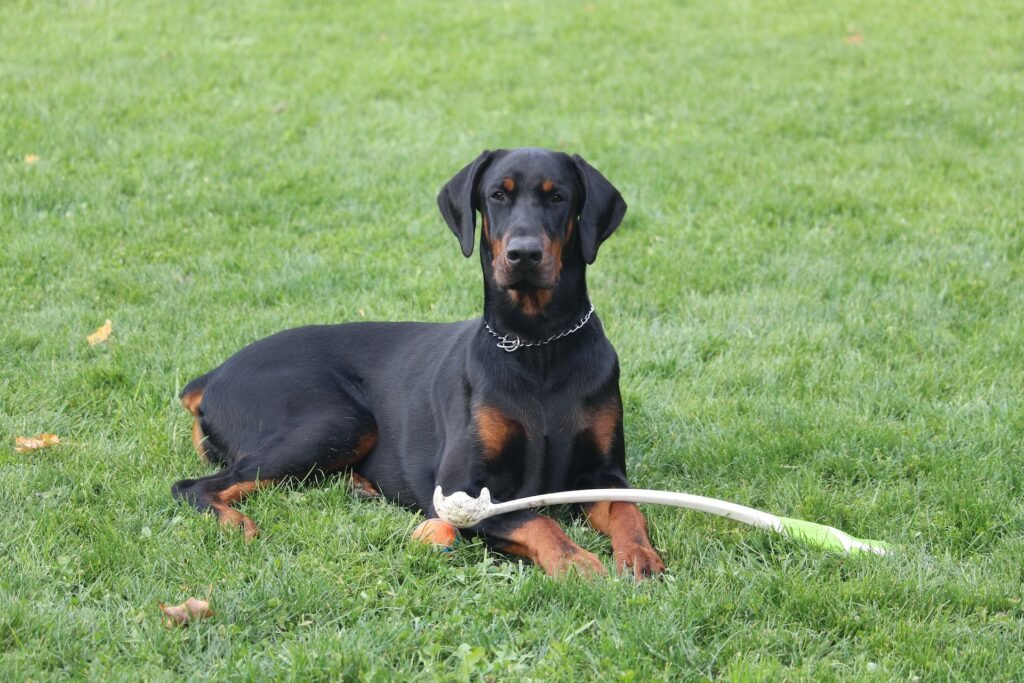
His Apolda dog shelter had many dog breeds at his disposal, so Dobermann began cross-breeding some favorable dogs with the intent of developing a loyal yet intimidating pup.
The result of his breeding program was the early Doberman Pinschers, which you can already guess how they got their first names.
Despite Herr Doberman’s good breeding skills, he did not keep extensive records on how he developed his hardworking dogs.
Most experts speculate that the Dobies were bred from the Black Tan Terrier, Rottweilers, and the smooth-coated German Pinschers.
It’s also believed that the Dobermans carry some traits of the Greyhounds, Manchester Terrier, Weimaraner, and Beauceron although the exact ratio has not been determined.
Herr Doberman’s guard dog was an embodiment of loyalty, intelligence, ferocity, endurance, and strength.
The German Kennel Club Honored Herr Doberman by naming this breed in his honor, after his unfortunate death in 1894.
Two breeders, Otto Goeller, and Philip Greunig, are credited for transforming the Dobies to become more trainable and practical in handling.
The German Kennel Club officially inducted the Doberman Pinschers in 1900, and they made their way to the United States in 1908.
Doberman Pinschers gained popularity across Europe by the 1920s and they could also be found in some parts of Russia and South Africa.
Dobies were loved for their intelligence, loyalty, and hardworking nature which saw them transition from being guard dogs to serving alongside military forces and regular police.
5 Facts About Doberman Pinschers You Should Know
1. Doberman Pinschers are excellent guard dogs
Doberman Pinschers are naturally born to guard their family and property. These muscular dogs possess an inborn ability to assess situations and respond to danger.
The natural protective instincts of Dobies make their presence formidable whether guarding their human family or serving as police dogs.
Despite their ability to perceive potential threats, a well-trained Doberman can learn the difference between your regular visitors and bad guys.
2. Doberman Pinschers are loyal companions
Underneath the commanding stature of Doberman is a big teddy bear. These dogs can form unwavering loyalty and deep-rooted affection toward their human companions.
This faithfulness transcends beyond the immediate caregivers since most Dobermans often form passionate bonds with the entire human family.
3. Doberman Pinschers are highly energetic
Doberman Pinschers have natural athleticism which is complemented by their robust physical stature making them thrive on consistent physical and mental stimulation.
Your vigil Dobie will happily join you on a run around the neighborhood, or a hike on the hills, and will appreciate when you toss a ball or flying disk to them whenever you can.
4. Dobermans are smart dogs
Doberman Pinschers are consistently ranked among the most intelligent dog breeds.
Their keen brain power, combined with an eagerness to please, makes them quick learners and easy to train for various working roles.
Whether it’s grasping basic obedience commands, agility courses, or engaging in problem-solving tasks, Dobermans can do extremely well in brain-taxing activities.
5. Many dogs were used to breed the Doberman Pinscher
The history of Doberman Pinschers is an interesting tale, although one that is shrouded in mystery and uncertainty.
Herr Doberman was an excellent dog breeder but he did not keep detailed records of the breeds he used when developing his excellent guard dog.
However, many experts have reviewed the Dobies’ genetic materials and concluded about the possibility of certain dogs who were used to breed the Dobie.
They include Rottweilers, Greyhounds, Manchester Terrier, Great Dane, Black and Tan Terrier, and Beauceron.
Doberman Pinschers Puppies
Welcoming a young Doberman should be an experience filled with joy and anticipation, yet one that catches many novice pet parents by surprise.
Dobies are built for activities, so you should expect your new pup to seek more opportunities to play and interact with all family members.
These active pups can be great companions to people who live an active lifestyle.
Your growing Dobie will happily accompany you during evening strolls and occasional runs in the dog park.
Many people shy away from adopting a Doberman puppy since they believe it will be difficult to handle their high energies.
When planning to own this dog, we encourage you to start training them from an early stage and ensure they get enough opportunities to play and socialize.
Doberman Pinschers Types
1. American Doberman Pinscher
The American Doberman has a refined and sleek body build made for appearance in dog shows. They are characterized by slender and more angular stature.
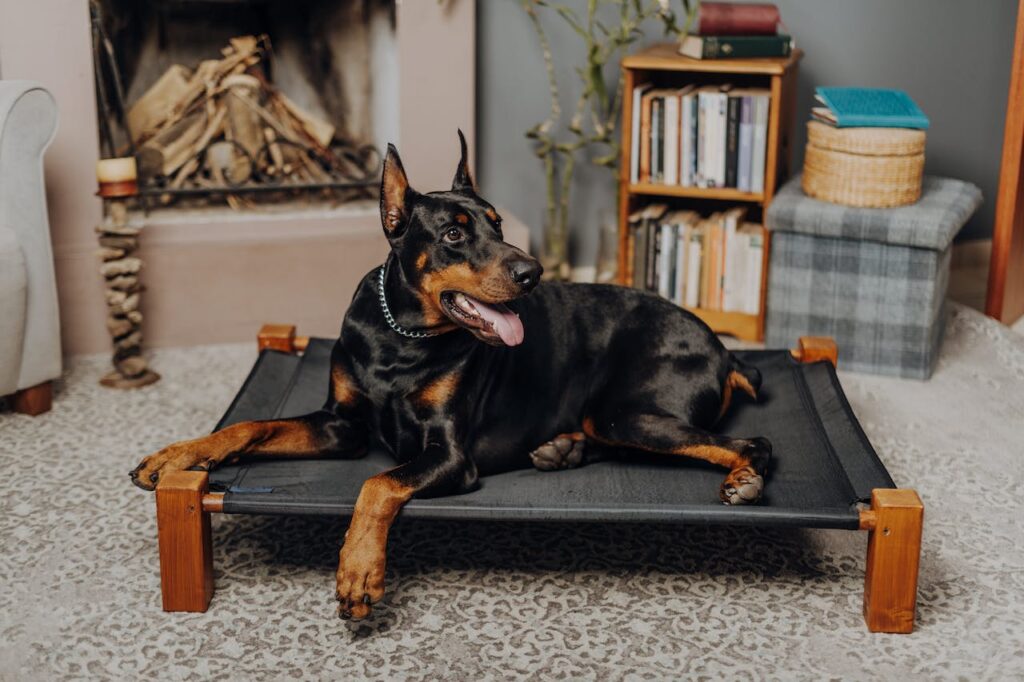
American Dobies have an outgoing and stable temperament which makes them well-suited for families and those seeking loyal companions.
Despite their refinement in personality, the American Doberman Pinschers can also serve as excellent watchdogs for families and protectors of properties.
2. European Doberman Pinscher
The European Doberman Pinschers are similar to their American counterparts in many aspects, except that they have a slightly larger and taller body frame.
These Dobies are much thicker and more muscular because of their prevalence for use as working dogs or guard dogs.
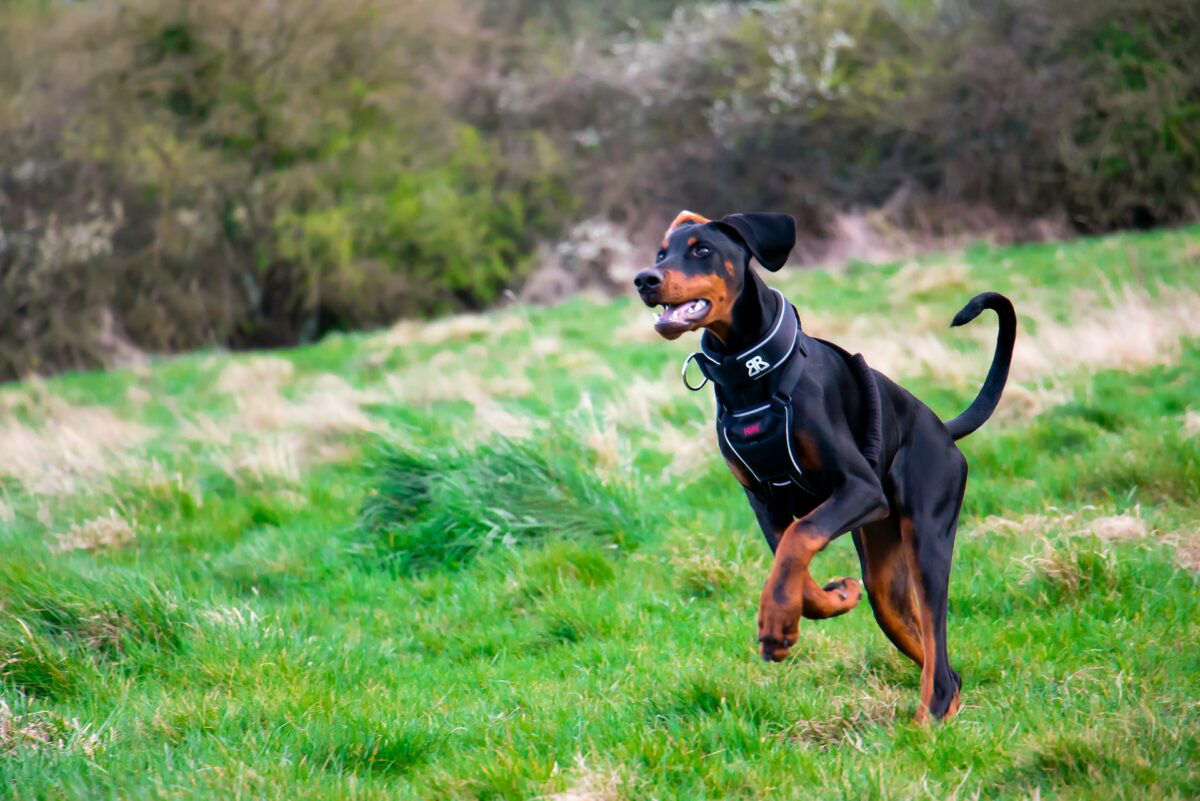
European Dobermans tend to exhibit stronger protective instincts, making them well-suited for roles that require guarding and security work.
Both types of Dobermans have similar coat colors, although the European version is more highly toned than the American one.
Doberman Pinscher Physical Characteristics
Size and Weight range
A fully grown Doberman Pinscher male can achieve a shoulder height of between 26 – 28 inches while their female counterparts’ height averages 24 – 27 inches.
In terms of weight, an adult male Dobie can weigh anywhere between 75 – 100 pounds while a female can tip the scale to an average range of 60 – 90 pounds.
Coat colors and texture
In the past, most Dobermans were black dogs with brown accents. However, some of the other acceptable colors by the breed standard include: white, blue, fawn, and red.
The Dobermans’ coat is dense and smooth, which gives them a visual allure and a nice feeling to the hand when touched.
Distinctive features
One of the top highlights of the Doberman Pinschers is their muscular body build with athletic physique which makes them excel in intensive activities.
These dogs are also known for their wedge-shaped head with a well-defined jawline which gives them an elegant and poised stance.
It was a common practice for Doberman ears to get cropped in the past, for historical reasons, but the practice is becoming less common due to health concerns.
Doberman Pinscher Temperament and Personality
Most Doberman Pinschers are surprisingly introverted, shy, and reserved but well-trained ones are outgoing and highly sociable.
Dobies can create a personal space bubble around them, and they rarely let strangers into their valuable bubble.
In general, Dobermans can make loyal friends and strong bonds with their human family, provided they are trained and socialized from an early stage.
Contrary to popular belief, Dobermans are not vicious attack dogs, but they are always alert to protect their owners from looming danger.
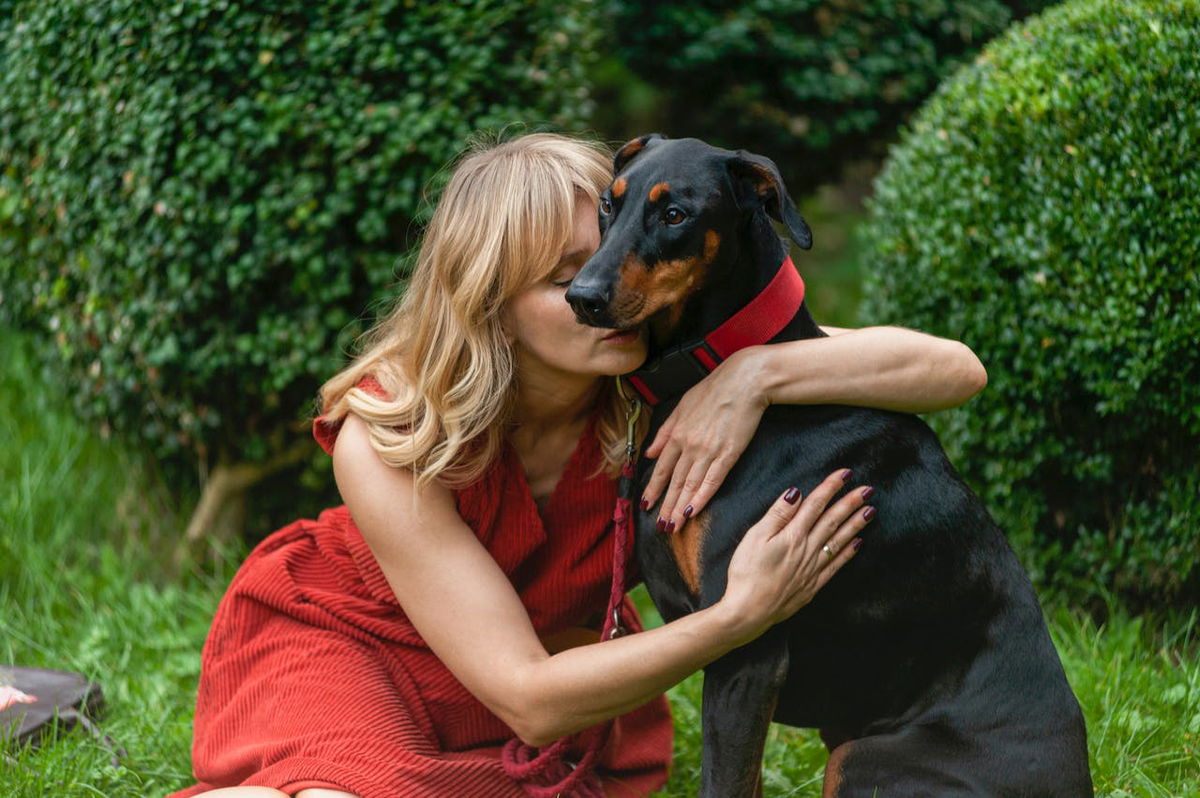
Guarding their human caregivers from bad guys is just one of the ways Dobermans can show their loyalty and friendship.
The social antics of Dobermans are demonstrated in their love for cuddles, belly rubs, and gentle strokes from their favorite humans.
Dobermans are excellent with older kids who have been taught how to interact with dogs. Younger kids can live with Dobies, although they can provoke the dog to aggression during inappropriate games.
Novice dog owners can own Doberman Pinschers, although they must be ready to meet their furry friend’s activity demands.
Doberman Pinscher Intelligence
Doberman Pinschers are super smart dog breeds. They were ranked as the 5th most intelligent dog breeds out of 138 breeds tested by Prof. Stanley Coren.
The renowned canine psychologist tested the dog breeds for their ease in obedience training and working roles.
The impressive brainpower of Doberman Pinschers makes them an easy-to-train breed with positive reinforcement and minimal repetition.
Doberman Pinscher Health and Lifespan
Average lifespan
The average life expectancy of most Doberman Pinschers is about 10 – 12 years, with some individual dogs coming short of this range while others exceeding it.
Keep in mind that several factors can affect the longevity of your lovely Dobie, including underlying health conditions, genetics, and overall care.
Common health issues and genetic disorders
Doberman Pinschers are generally healthy dogs, although they can be predisposed to certain health problems due to poor breeding and care.
Trustworthy dog breeders are eager to raise puppies according to the laid-out standards established by reputable Kennel Clubs like the AKC.
Some of the common health problems that can occur in Doberman Pinschers include the following:
- Von Willebrand’s disease
- Gastric dilatation-volvulus (GDV)
- Caudal cervical spondylomyelopathy
- Enlarged heart or Dilated cardiomyopathy (DCM)
- Hair loss
- Narcolepsy
Preventative measures for good health
A quick internet search will show you lots of Doberman Pinscher puppies listed for sale near you, but you should only exchange cash after assessing the quality of the breeder.
Before purchasing a dog from a breeder, you should enquire about their trustworthy score and go for those who prioritize the health of their puppies.
A reputable breeder should provide you with health clearance certificates for both parents and should be willing to answer all your questions about your desired puppy.
Getting a Doberman Pinscher puppy from a good breeder reduces the chances of suffering hereditary conditions.
Your vet will also advise you on the recommended preventive health care to keep your Doberman healthy. This includes timely vaccination and effective parasite control.
Once you have your dog, it’s always important to plan regular visits to the vet for physical exams and medical tests.
This will allow the vet to detect any chronic conditions in time and prescribe timely medication to boost the recovery chances of your Doberman.
Doberman Pinschers require a well-balanced dog food diet to keep them healthy and in good shape. A nutrient-rich diet should nourish your dog and prevent them from suffering deficiency syndromes.
In addition to proper food, taking your Doberman out for regular physical activities and mental stimulation helps keep their muscular bodies in good shape.
Doberman Pinscher and Allergies
Doberman Pinschers are moderate shedders. Allery-prone individuals should not worry about their Dobies’ shedding tendencies since they can be managed with proper grooming and hygiene practices.
Other types of pet allergens to watch out for include saliva and dog urine, which can cause negative reactions in allergic individuals.
Doberman Pinscher Grooming Needs
Dobermans are fairly easy to maintain compared to other common dog breeds. Their short, smooth coat can be brushed once a week to loosen dead hair and spread natural oils on the skin.
Doberman Pinschers don’t need frequent baths, most people wipe them down with a damp towel for spot cleaning.
You can plan a full shower once a month, and be sure to use canine-specific shampoo for the best results.
If your Doberman’s ear is natural (not cropped), then you need to wipe the internal part with a soft cotton ball dipped in a vet-approved ear cleanser.
Dobermans will appreciate regular nail trims to keep them comfortable when walking. Maintaining short nails is also a preventive measure for potential injuries.
Brushing your dog’s teeth daily using a soft toothbrush and canine toothpaste is ideal for preventing dental diseases and halitosis.
You can also use soft dental chews to keep up with the dental care requirements by preventing the buildup of plaque and tartar.
Doberman Pinscher Exercise and Activity Levels
Activity level
Doberman Pinschers are a high-energy dog breed, and they require plenty high high-intensity exercise for about 2 hours a day to keep them healthy.
The exercise period can be split into manageable sessions throughout the day to prevent overworking your Dobie (especially young ones).
Dobermans who don’t live an active lifestyle can devise their own ways of staying active, which can often lead to destructive and unwanted habits.
Suitable activities and games for Doberman Pinschers
The natural athleticism of Dobermans demands moderate to high-intensity physical activities and mental stimulation.
These loyal dogs are far from being couch potatoes, they can thrive in an active family and would gladly join every outdoor adventure with pride.
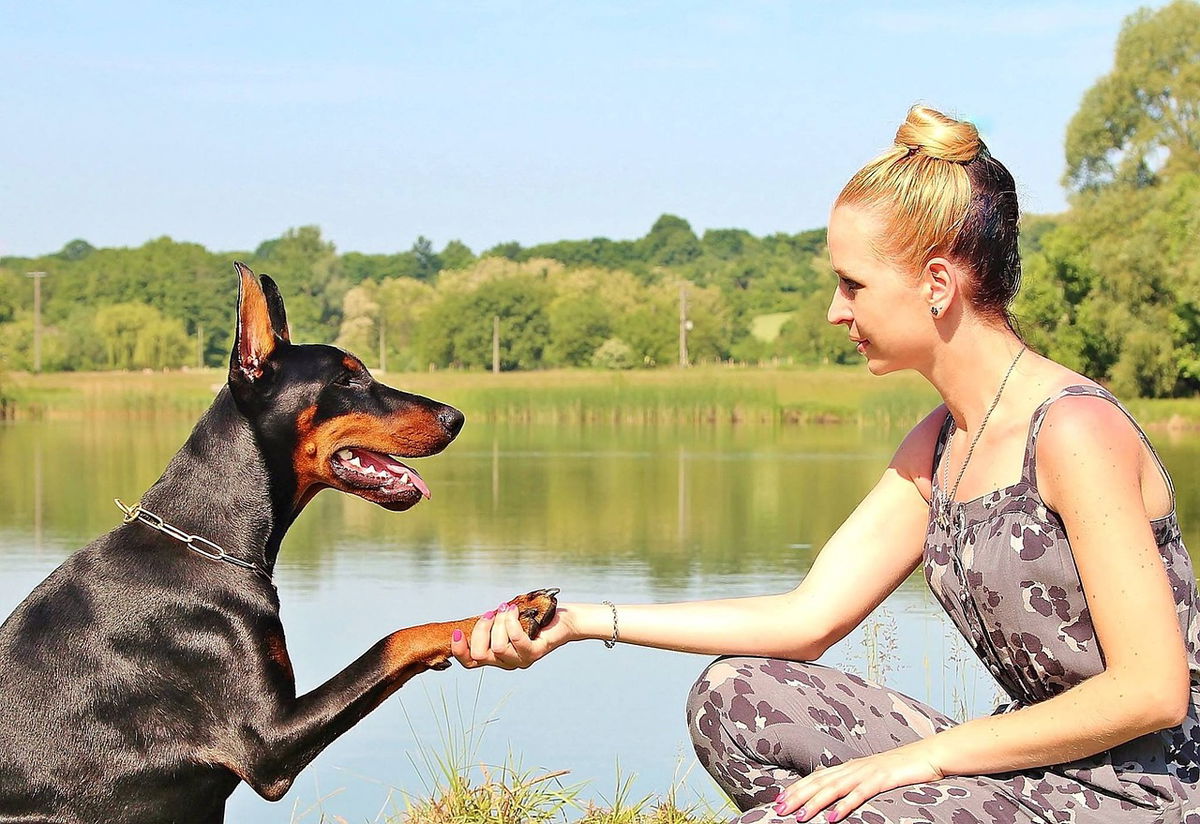
The following are some of the suitable activities and games for Doberman Pinschers:
- Walking and running
- Playing fetch and retrieval
- Agility courses
- Obstacle training
- Tug of war
- Obedience training
- Frisbee
Importance of mental stimulation
Brain-taxing games can improve your Dobie’s decision-making skills and overall judgment to make them more responsible.
Mental stimulation is also important in reducing boredom and preventing your dog from sinking into stress, depression, and anxiety.
Playing interactive games with your Doberman Pinscher can improve your bond and make the relationship even better.
Doberman Pinscher Training and Socialization
Doberman Pinschers are superbly intelligent and they can easily take any obedience training with minimum repetition.
They love to keep their minds active and challenged, so it can be easy to teach them basic commands such as sit, stay, or stop.
The mental acumen and natural athleticism make it very easy to train Dobermans for work and agility courses.
Consistent training from puppyhood can make your Doberman a highly sociable canine with a stable temperament and outgoing nature.
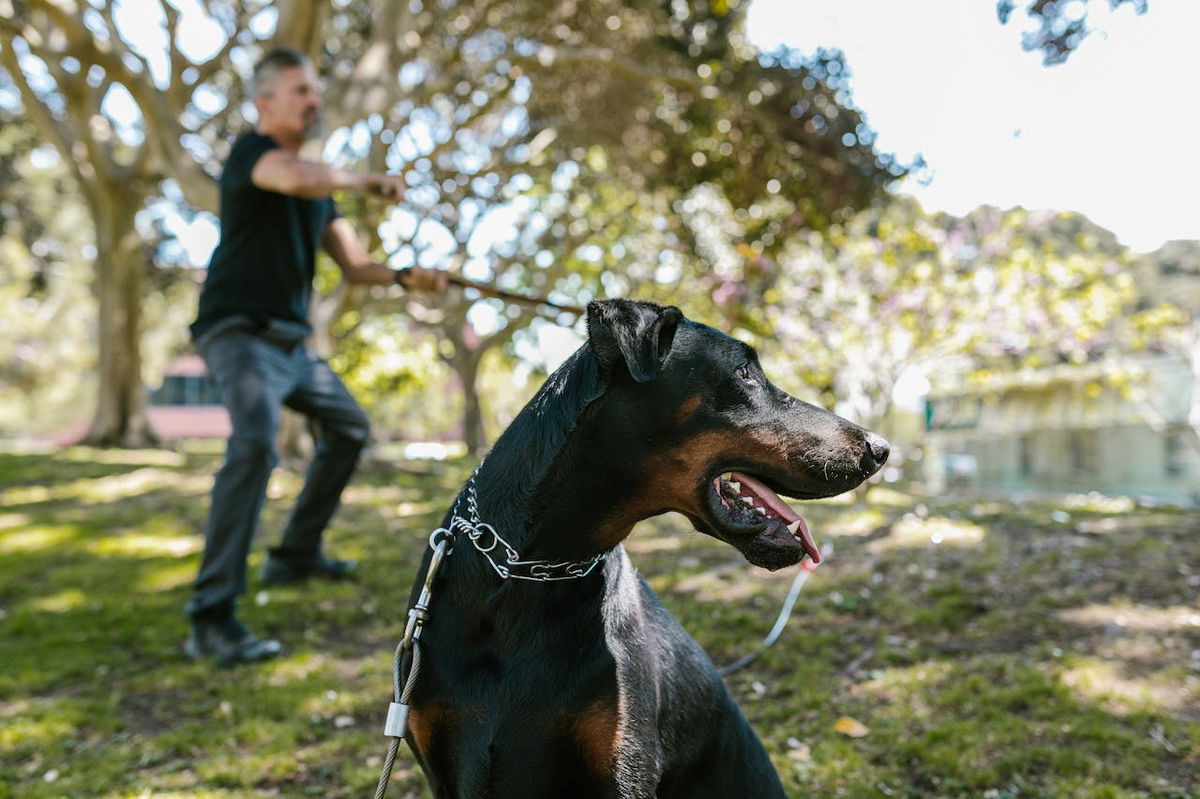
Continual social training is highly important to ensure your Doberman is not overly fearful and aggressive toward people and other pets.
It is always recommended to keep your Dobie leashed during walks because they can be defensive when they perceive looming danger.
Teaching your Doberman new tricks will help them gain a purpose in life and this will keep them healthy and contended.
Doberman Pinscher Living Conditions
Doberman Pinschers will appreciate homes where they can spend quality time outdoors to burn off their high energies in constructive engagements.
Apartment living is not the best condition to keep a Doberman, but you can plan to have them regularly walked or exercised in nearby dog parks.
Small homes are not favorable for Dobies, because they are large dogs and may end up occupying lots of space in the minimal environment.
Doberman Pinscher Diet and Nutrition
The high-energy nature of Dobermans requires them to be fed two meals a day, which can consist of 3.5 cups of high-quality dry dog food.
However, the exact amount of food your dog needs depends on several factors including age, activity level, and size, among other factors.
Dobies are predisposed to bloat, and you can help them out by offering smaller meals rather than one large meal.
You can plan a visit to your vet for a detailed discussion about the nutritional needs of your Doberman Pinscher. Your vet should make tailor-made recommendations about the type of food and portion control.
Always monitor your Dobie’s weight and be sure to adjust their calorie intake to prevent obesity, which can open up the possibilities of other chronic conditions.
Doberman Pinscher Pregnancy and litter size
The average gestation period of most Dobermans is about 9 weeks (63 days), with an expected litter size of 6 – 8 puppies. It’s not uncommon for a Doberman to deliver ten or more healthy puppies at once.
You can ensure a smooth pregnancy journey and whelping process by keeping up with pre-natal care and ensuring your Doberman mother-to-be is kept in a stress-free environment.
Conclusion
Although Dobermans were initially bred to be menacing guard dogs, they have been fine-tuned over the years to become sweet family companions.
Dobermans are wonderful dogs to keep around children, provided they are well-socialized and properly trained from a young age.
Their powerful and intimidating outward appearance does not reflect the breed’s inner personality and soft spot for caring humans.
We hope our detailed Doberman Pinscher dog breed info will make most people shun the stereotype about these dogs, and advance their true personality of being smart, alert, and obedient.
Laura is the founder of Furs'n'Paws. She is a also a pet writer and expert with more than 20 years of experience of working with dogs and cats. She developed a very strong love for animals at a young age. Her passion led her to establish a thriving pet sitting and dog walking business in Dubai. As an expert in pet training, behavior, and nutrition, Laura is committed to helping pet owners and pet lovers by offering high-quality information on a wide range of topics.


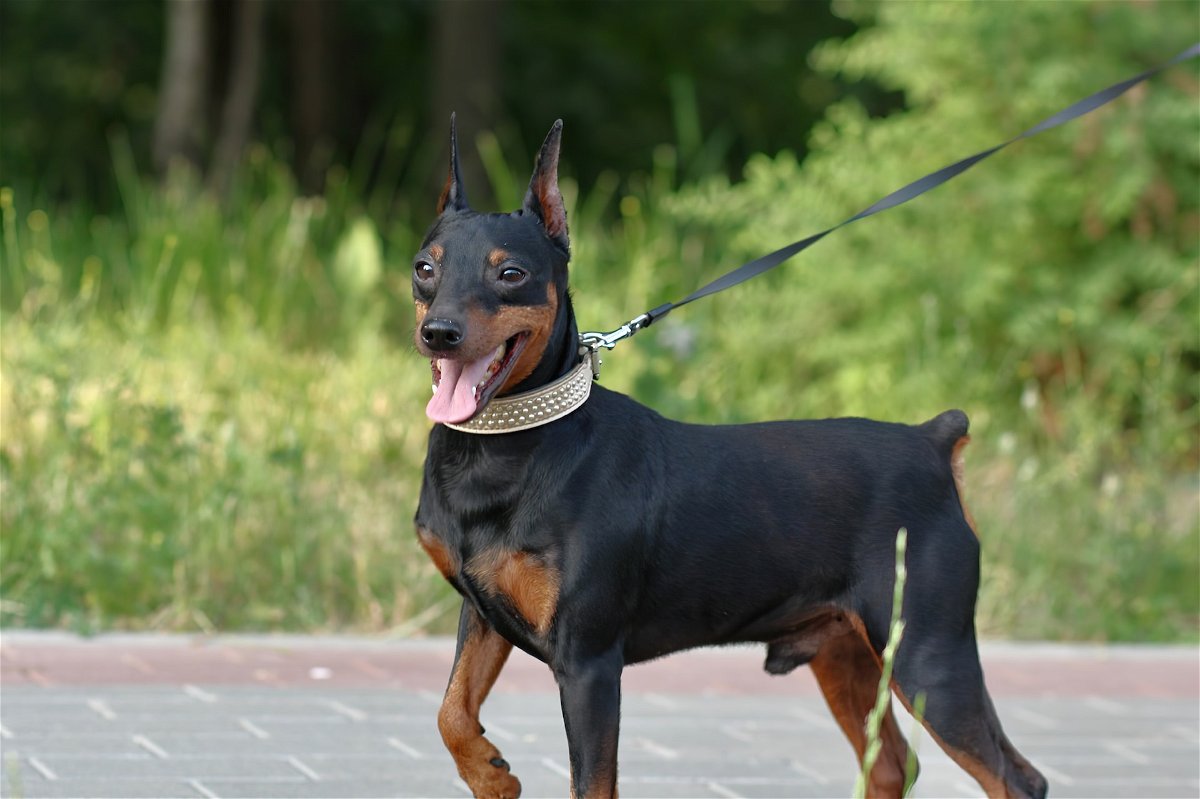
No responses yet